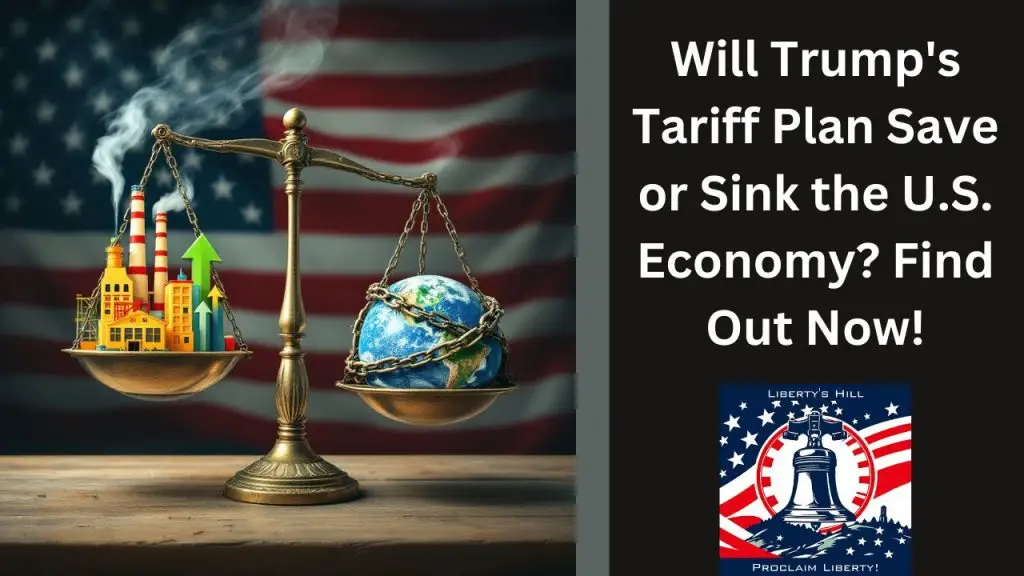Will Trump’s Tariff Policies Grow the American Economy?

In the ongoing discussion about economic policies, tariffs have become a focal point, especially with the proposals associated with former President Trump. This blog will dissect the implications of Trump’s tariff policies on the American economy, drawing insights from historical contexts and economic principles. The goal is to foster a national conversation that transcends political divides, focusing on the core issues of liberty, justice, dignity, and prosperity.

Photo by Nick Fewings on Unsplash
Understanding Tariffs and Their Historical Context
Tariffs are taxes imposed on imported goods, primarily intended to protect domestic industries from foreign competition. However, the historical implications of tariffs reveal a different narrative. During the Great Depression, the Smoot-Hawley tariffs were enacted with the intention of protecting American jobs. Instead, they led to a drastic reduction in international trade and a significant rise in unemployment.
According to economist Thomas Sowell, the Smoot-Hawley tariffs raised American tariffs to unprecedented levels, prompting other countries to retaliate. This created a cycle of trade restrictions that ultimately did not yield the desired results. Instead of protecting jobs, these tariffs contributed to a decline in global exports, which fell to one-third of what they had been just a few years earlier. This example serves as a cautionary tale for contemporary tariff policies.

Photo by Stephen Dawson on Unsplash
The Economic Consequences of Trade Restrictions
The economic principle that underlies the discussion about tariffs is the idea of comparative advantage. Free trade allows countries to specialize in the production of goods where they have a relative efficiency, leading to overall economic growth. Conversely, trade restrictions tend to reduce efficiency, lower standards of living, and fail to achieve the intended increase in employment.
Sowell highlights that while tariffs may provide short-term relief to specific industries, they come at the expense of broader economic health. The fallacy of composition suggests that what benefits a specific sector does not necessarily benefit the economy as a whole. For instance, while a tariff may protect jobs in one industry, it can lead to job losses in others, creating an imbalance.

Photo by Artem Beliaikin on Unsplash
The Risks of Trump’s Tariff Proposals
Trump’s proposal to replace income taxes with tariffs raises significant concerns. While the intention may be to create a more equitable tax system, the reliance on tariffs as a primary revenue source could lead to unintended economic consequences. The historical context of tariffs serves as a reminder of the potential pitfalls associated with such policies.
During the Smoot-Hawley era, unemployment rose sharply, contradicting the claims that tariffs would create jobs. The unemployment rate escalated from 6% in June 1930 to a staggering 26% just two years later. This historical lesson underscores the importance of critically evaluating the potential outcomes of tariff policies.

Photo by Jeremy Bishop on Unsplash
Building a National Conversation
It’s crucial to engage in a civil discourse about economic policies, transcending political affiliations. Many Americans may agree on the goal of fostering liberty and human flourishing but may diverge on the means to achieve these goals. The conversation about tariffs should not be confined to partisan lines; rather, it should focus on the principles of economics and their implications for society.
Engaging in discussions about tariffs allows citizens to take responsibility for their economic education. Understanding the principles of liberty and economics is vital for the future of the nation. As Dr. Bill Brannan emphasizes, it is a collective responsibility to educate ourselves and future generations on these issues.

Photo by Mathieu Stern on Unsplash
Encouraging Grassroots Movements
The hope for America lies in grassroots movements that prioritize education and civic engagement. By fostering a culture of informed citizens, the electorate can hold politicians accountable for their economic policies. A well-informed populace is more likely to advocate for policies that promote sustainable economic growth rather than short-term fixes.
Through education, citizens can better understand the potential risks associated with tariffs and advocate for policies that align with principles of free trade and economic efficiency. This proactive approach can lead to a more prosperous and equitable society.

Photo by Kimberly Farmer on Unsplash
Conclusion: The Path Forward
As we navigate the complexities of economic policies, particularly tariffs, it is essential to draw from historical lessons and economic principles. While there may be differing opinions on the best course of action, the focus should remain on fostering a dialogue that seeks to understand the broader implications of such policies.
Ultimately, the goal is to create a world that values liberty, justice, dignity, and prosperity for all. By engaging in thoughtful discussions and prioritizing education, Americans can work together to ensure that economic policies serve the best interests of the nation as a whole.

Photo by Tomasz Frankowski on Unsplash


